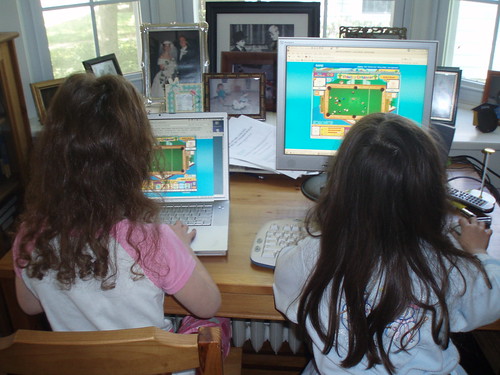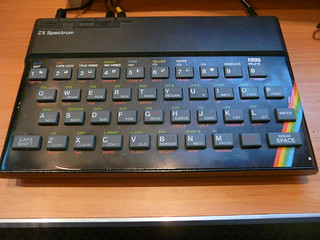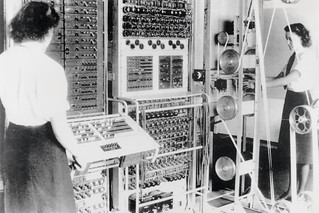I wrote and published this more than ten years ago (in 2014). Apart from the fact that some terminology has changed and some resources are no longer available, it is still relevant. What a sad situation.
It was International Women’s Day on March 8th, so it seems quite timely (in a belated sort of way) to focus on gender issues as they relate to computing and ICT.

Start them young: Social Computing, by Laura Blankenship https://www.flickr.com/photos/lorda/
What are the gender issues?
In the context of technology, the main issue is that not enough girls go into computer science studies beyond the statutory provision, or computer-related jobs. Various figures are cited, but it seems to be generally agreed that only around 16 or 17% of students in undergraduate courses in Computer Science in the UK are female, and only around 27 or 28% of employees in information technology jobs are women — a figure that is true for both the UK and the USA.
Why is there such a discrepancy?
Various reasons are cited, all of which are probably true. They include:
A perception that it is too geeky
Too many boys on undergraduate courses — I saw a figure cited in one forum that there is a ratio of 5:1, males to females; that’s probably anecdotal, but it kind of doesn’t matter whether it’s objectively true or not, because it’s perception that determines behaviour, not necessarily reality; of course, this means that the imbalance is a self-fulfilling prophecy
Too few female role models
Probably the perception that being a “computer geek” means spending long periods without washing or sunlight, and living on beer and pizza
In school, unless checked, boys tend to dominate classroom discussion.
Now, before anyone complains, I should just like to say that I have not intended this article to be an academic treatise, but a statement of what seems to be many people’s perception of the situation. The important thing is, what can be done about it? I would suggest the following.
Solutions
In no particular order of priority:
Ensure the work you set is interesting, involves problem-solving and, importantly, involves collaborative problem-solving; I realise there is a danger of gender stereotyping, but I would say that from my experience of teaching, girls are more engaged when the classroom is a place of collaboration rather than competition; in fact, I have also found that project-based learning is better for boys as well
Ensure the work is authentic, in the sense of having potentially useful application in real life
You could, if you like, establish a computer club for girls only. I don’t agree with that approach (except in girls’ schools, obviously), but such a course of action does have the merit of keeping the boys out of the picture altogether; if the girls in your school feel intimidated by the boys, this may be the answer
However, I think a better option is to establish rules of engagement that preclude the boys hogging discussion, calling out the answers to questions, or behaving in ways that make girls feel less self-confident than is justified. For example, there are several assessment for learning techniques you can employ that will address these points. (Subscribers to Digital Education can avail themselves of a free resource I created called 19 Assessment for Learning Techbiques, which is in pdf format. You can download it from the subscribers' resources page once you have signed up on the newsletter page.) That would also teach boys how to behave constructively towards females in wider society.
Make classes aware of the role of women in both the history of computing and in society today. See the Resources section below for help with this.
Seek out women speakers who could inspire the girls in your school. These may include people in local companies, or students at a local college in university.
Clarity begins at home
This is another set of solutions, but I think it is so important that I have decided to make it a section in its own right.
You need to know the data.
How many girls opt for your subject(s)? If there is a wide disparity between the two genders, find out why. Ask your “non-customers” why they didn’t choose your options. This information could be useful next year. You could even run a survey now, asking pupils what sort of course would interest them, making sure to provide them with some genuine options.
Do you know how well girls are doing in ICT and Computing compared with boys? If there is a disparity, why? And what are you going to do about it? (This could work the other way of course, and in my experience often does: the girls are doing better than the boys. Whatever the case, you need to know if there is a disparity, and if there is, find out why.)
Are the girls in your classes more, less, or equally as active in discussions as the boys? If not equally, why not, and what are you going to do about it?
You can use your pupils, and your school’s digital leaders, if it has them, to help you devise ways and means of (a) finding out the answers to some of these questions and (b) helping you come up with solutions.
You know, if you’re stopped for speeding and you tell the police you weren’t aware of the speed limit, they will inform you that ignorance is no excuse in the eyes of the law. I believe the same holds true when it comes to how different groups of pupils – in this case girls and boys – are doing. If you don’t know, find out!
A useful Resource
“The women are here”: special edition of the free magazine, Computer Science for Fun, which you can download from here: http://www.cs4fn.org/annual/cs4fnannual2.pdf
This article first appeared in Digital Education, the free newsletter for those with a professional interest in educational ICT and Computing. To sign up, please complete the short form on our newsletter page. We use a double opt-in system, and you won’t get spammed.










I wrote and published this more than ten years ago (in 2014). Apart from the fact that some terminology has changed and some resources are no longer available, it is still relevant. What a sad situation.